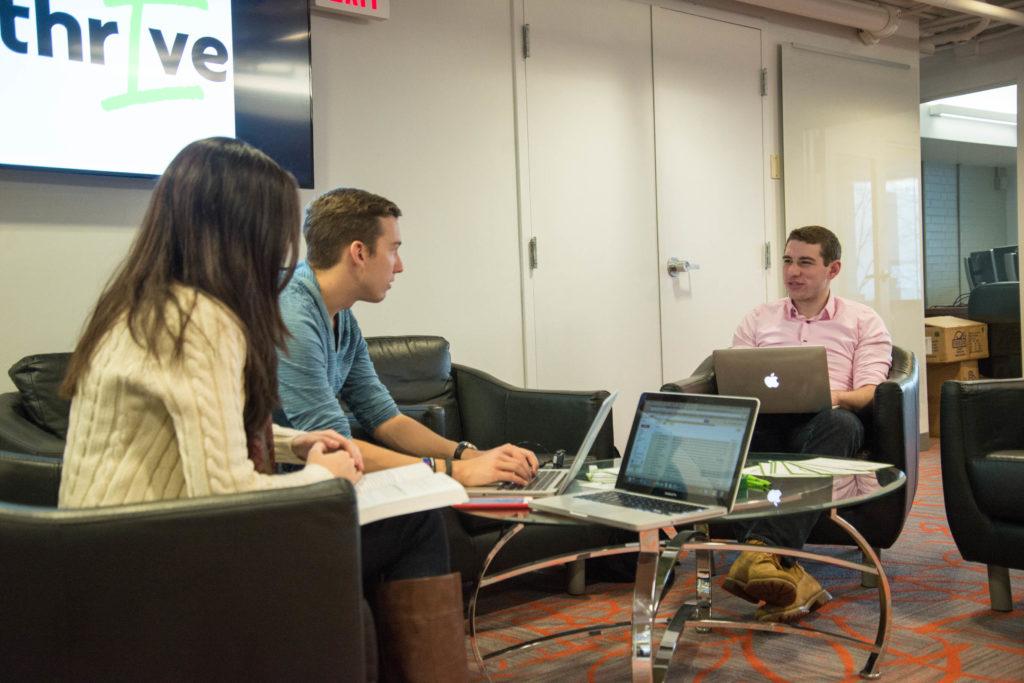By Amanda Hoover, deputy news editor
For those who don’t know the first thing about starting a 401(k) or stretching a paycheck for two weeks, a new center on campus can set students on the path toward financial literacy and independence.
The Center for Financial Independence, also known as Thrive, opened its doors to students last week in 101 Curry Student Center.The student-run department is an offshoot of Student Financial Services (SFS) and plans to assist other students with financial questions on everything from budgeting a co-op paycheck to saving for retirement – all with a focus on what students want to share or learn.
“We want students to come into this space and reach out to the team members with ideas,” Jordan Lieberman, a senior finance and political science major and COO of Thrive, said. “We want students creating content and programming for students.”
Lieberman is one of four students who currently work for the center, and they hope to recruit more as the semester continues. Students could contribute their time on a volunteer basis for informal projects, or possibly receive a stipend from the center for working on projects that require more time.
While some other university personal finance centers have a student leader or ambassador component, Thrive is the only completely student-driven center in the country, according to Lieberman and Thrive’s director Anya Ilkys. Between the hours of 9 a.m. and 5 p.m., students can come to the center to ask a peer advisor questions or access student-generated content, such as an app or brochure. Other special programs are likely to occur in the evening this semester in order to reach out to students on co-op as well as those in classes.
A few years ago, SFS at Northeastern began researching financial literacy and considered ways to develop educational outreach programs for students. As the topic became a concern for college campuses nationwide, Northeastern searched for ways to bring educational programming to students through the financial aid office, but found it called for greater action.
“It grew into ‘how can we make this Northeastern, how can we make this different, how can we be leaders in the field and really put ourselves out there,’ so this whole notion of student-led, student-driven came up,” Ilkys said. “Once we started getting students involved and saw how enthusiastic they were, it really inspired us to keep going in that direction.”
Thrive encourages students to bring ideas to the office and implement them through peer advising, programming or creating other content through design or technology. Others, eager to learn about anything from credit card interest rates to buying a car, can seek personal peer advice or use the resources within the center.
“Students find themselves with a broad range of financial decisions they never had to make before,” Eliot Sherman, a finance professor at Northeastern, said. “In many cases, they don’t have as much knowledge, experience or information resources to help them make those decisions.”
Sherman, the creator and instructor of a class on personal finance for primarily non-business majors, has heard student questions ranging from credit card interest rates to budgeting and savings from his students. He believes that resources like Thrive are vital for current students to ensure financial literacy and stability for their professional lives.
“One of the things that we all emphasize now in the finance department is the need for a student at the age of 20, 21, 22 to start thinking about retirement,” Sherman said. “Students should be looking ahead. They need to be looking ahead. They also have to be conscious of the decisions they’re going to have to make.”
Thrive plans to inform students on topics like living on a budget, filing taxes, investing, buying a car, negotiating salaries and managing debt.
“A lot of these skills, I would say almost every one of these skills, are things that apply to your entire life,” Lieberman said. “Everyone should know roughly how to budget a paycheck if you’re going to have a paycheck for the next 50-60 years. Certainly some of these skills, like what is a mortgage, aren’t terribly relevant to college students right now, but they’re things that you need to learn and it’s a great opportunity for students while they’re here to have this resource.”
The student-driven aspect of Thrive creates a peer-to-peer advising atmosphere where students can learn from others’ experiences and prepare for financial challenges that could occur while they’re at Northeastern or once they graduate.
“Students have a better understanding of what [other] students want and need,” Lieberman said. “You can talk much more relevantly about being a student – what they did with their money, the mistakes they made with their money.”
As Thrive continues to shape its mission and programming, the center will solicit student input and participation while also consulting with expert advisors to vet ideas and information. They plan to begin educational events at the end of the month.
“A lot of it is in the hands of students, but there is professional backing and a professional feel to this,” Ilkys said. “This is not just a club. This is way more than just a club on campus.”
Photo by Scotty Schenck













